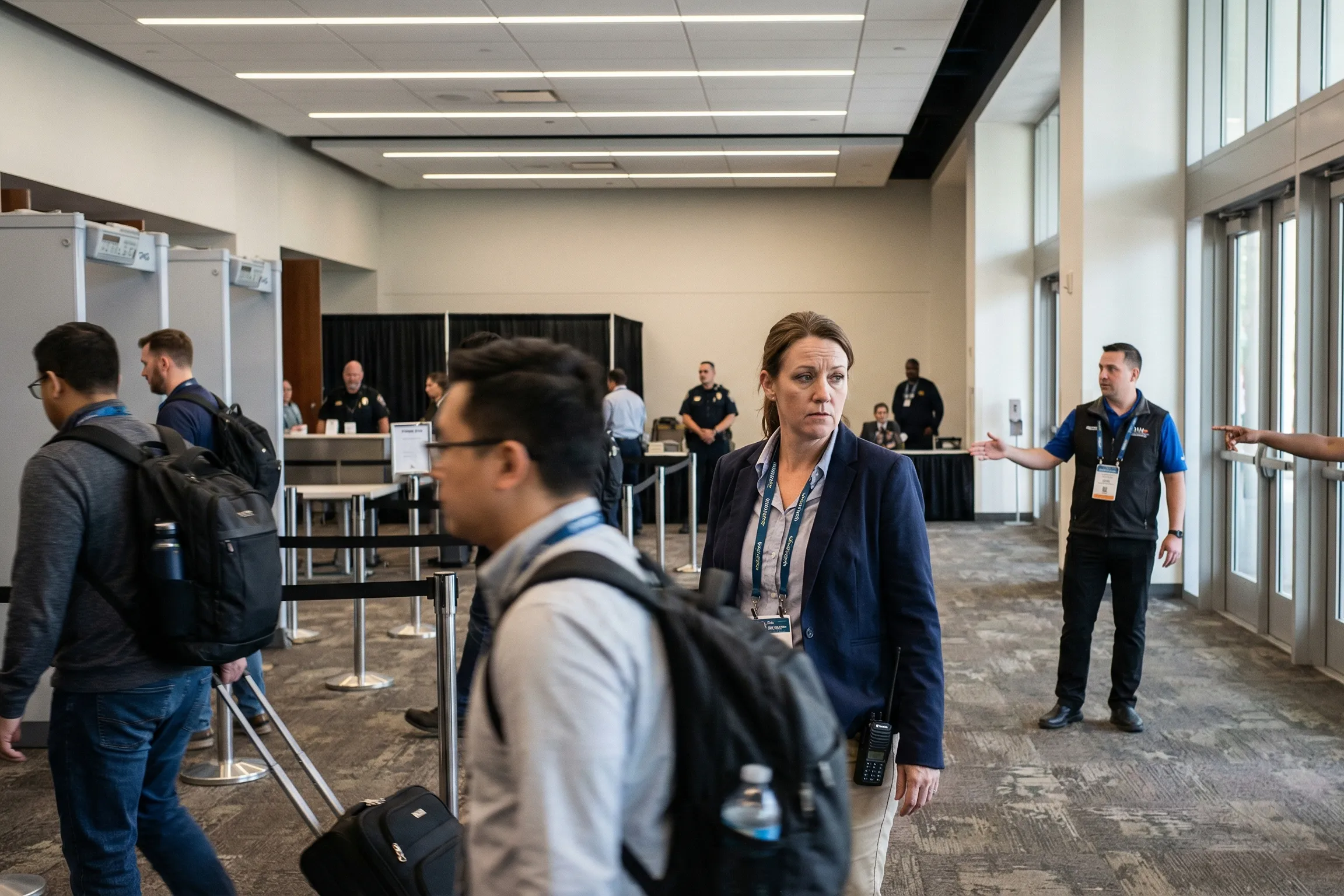CEO EXCERPT
“Premium event staffing isn’t just about filling roles; it’s about protecting your brand. In major markets, true value comes from compliant, insured, and well-managed teams. Transparent pricing isn’t a feature; it’s our standard.” - CEO Event Staff
Is your event budget looking at the talent or the total liability?
Did you know a Brand Ambassador in New York carries a different compliance price tag than one in Austin?
Are you prepared for the "invisible" layers that turn a standard hourly rate into a complex financial equation?
Budgeting for premium event staffing is like navigating an iceberg,the hourly rate is merely the visible tip. While market rates range from $28 to $75+ per hour, the submerged weight of insurance, compliance, and union rules often dictates your actual bottom line. Relying on sticker prices alone risks budget collisions. To ensure your event sails smoothly, you must account for the geographic disparities and operational realities that "cheap" quotes ignore. Use this guide to forecast true full-service costs for your next activation.
A rate below $25/hr in a major metro area is a red flag for 1099 misclassification. Legitimate agencies price higher to cover W-2 payroll taxes and comprehensive liability insurance.
Executive Summary
Event staffing cost is a moving target, fluctuating based on city-specific labor laws, union density, and seasonal demand. This guide provides a transparent breakdown of event staff hourly rates, hidden premiums, and the financial reality of booking compliant, high-caliber teams for corporate event staffing services.
What Does Premium Staffing Really Cost?
Budgeting for premium event staffing pricing requires more than a simple hourly calculation. The standard rates in major US markets range from $28 to $45 per hour for general staff, with supervisors and specialized talent commanding $45 to $75+ per hour.
However, the final full-service event staffing cost breakdown is heavily influenced by city-specific labor laws, venue union requirements, and the level of insurance and compliance coverage your event demands. A staffing quote in New York City will look drastically different from one in Austin or Phoenix, even for the exact same role. This guide provides the data you need to forecast event staffing cost accurately for your next multi-city activation, ensuring your event staffing budget aligns with the operational reality of your venue.
A rate below $25/hr in a major metro area is a red flag for 1099 misclassification. Legitimate agencies price higher to cover W-2 payroll taxes and comprehensive liability insurance.
Why Event Staffing Costs Vary Across Cities
The price of labor is never static. When you budget for a multi-market roadshow, you must account for four key variables that drive event staffing cost.
- Labor Market Differences: The local cost of living directly impacts the base wage required to attract quality talent. A rate that attracts top-tier talent in Ohio may not even meet minimum wage requirements in San Francisco.
- Local Wage Laws: Minimum wage variances (e.g., California's strict labor laws vs. Texas's more flexible regulations) set the absolute floor for event labor pricing. Ignoring these can lead to immediate compliance violations.
- Venue Union Rules: Union-heavy cities like NYC and Chicago force a higher event staffing cost due to mandatory minimum hours (often 4-8 hours), specific role jurisdictions, and required break relief.
- Seasonal Demand: Peak seasons create temporary price surges. Staffing an event during Art Basel in Miami or "Tech Season" in San Francisco means competing for a limited pool of talent, driving event staffing rates by city up by 20-30%.
Geography is the single biggest multiplier in your budget. A "national rate" is a myth; you must budget dynamically based on the specific labor ecosystem of each city.
Standard Event Staff Roles and Their Typical Hourly Rates
To build an accurate event staffing budget, you need to know the market rate for each specific role. Here are the standard ranges, which directly influence your total event staffing cost.
Registration Staff / Check-In Teams ($28–$35/hr)
These are high-volume roles where efficiency is key. Investing in experienced registration staff lowers your total event staffing cost by reducing check-in time, which prevents the need for overtime or additional "floater" staff to manage long lines. This is a core part of our Check in Staff service.
Ushers / Guest Flow Staff ($28–$35/hr)
These roles are critical for large venues to manage crowd movement safely. While the rate is similar to registration, the physical demands are different, often requiring staff who can stand for 8-10 hours and manage large crowds.
Brand Ambassadors / Lead Generators ($35–$55/hr)
The higher rate reflects sales skills and the ability to actively engage strangers and capture data. A "cheaper" ambassador who stands passively behind a table is a wasted investment, making the cost of brand ambassadors a critical ROI factor. This is why companies invest in professional Brand Ambassadors.
Crowd Management / Access Control ($30–$45/hr)
This role requires specific safety training and often certifications (like Guard Cards), influencing the final cost of event staff. They are distinct from police or armed security but are essential for perimeter control.
Supervisors / Team Leads ($45–$75/hr)
Essential for teams larger than 10. Their cost pays for itself by preventing overtime, managing mandatory breaks, and handling on-site interpersonal issues so you don't have to. Our Production Teams provide this essential layer of management.
"General" staff are for simple tasks; "Specialized" staff drive ROI. Do not use a lower-rate Usher for a role that requires the sales psychology of a Brand Ambassador.
Cost Breakdown: The "Premium" vs. "Cheap" Risk Analysis
When you see a quote that is 20% lower than the market average, you are not paying for efficiency; you are paying for risk. Premium event staffing pricing includes protections that "cheap" agencies strip out.
W2 vs. 1099 Risks
Premium agencies use W-2 employees. "Cheap" agencies use 1099 independent contractors. This shifts the entire tax and legal liability to you as the client. If the IRS audits the event, you could be liable for unpaid payroll taxes.
The Hidden Cost of Misclassification
Saving $5/hr on a 1099 worker can cost $10,000+ in fines or lawsuits if a worker is injured or misclassified, a risk heavily penalized by the Internal Revenue Service. This is a massive, hidden financial risk that many corporate legal teams will not accept.
Insurance & Compliance
Premium rates cover Workers' Compensation and General Liability insurance. Tier 1 venues often require COIs (Certificates of Insurance) with $5M+ limits, which "gig economy" apps cannot provide. This is why Fortune 500 brands trust premium agencies.
Replacement Guarantees
A premium partner guarantees a replacement for no-shows at no extra cost. This operational insurance is something that cheap agencies, who rely on unvetted databases, simply cannot offer.
The cheapest invoice often carries the highest liability. Premium event staffing pricing is effectively an insurance premium against legal, tax, and reputational damage.
City-by-City Pricing Expectations (Major US Markets)
Geography is the biggest multiplier in your budget. Here is what to expect in major markets regarding event staffing rates by city.
New York City
The highest tier. High base wages combined with complex union venue rules create premium pricing. Expect strictly enforced break times and overtime rules. The Bureau of Labor Statistics consistently ranks NYC as one of the highest cost-of-labor markets for hospitality.
Los Angeles
High demand from the entertainment sector drives up rates for "camera-ready" or highly polished staff. The "Hollywood standard" means you are competing with major studios for the best talent.
San Francisco / Bay Area
Tech industry wages inflate the baseline for all gig economy work, increasing event staffing cost per hour significantly. To get staff who are tech-savvy and professional, you must pay a premium.
Chicago
A tale of two cities. Non-union venues are standard, but McCormick Place and other major centers have strict, expensive labor rules that can double your effective hourly rate. See our guide on hiring event staff in Chicago for details.
Miami
Volatile pricing. Standard rates apply for most of the year, but "peak season" (Winter/Spring, Music Week, Art Basel) sees huge surges in demand and price.
Scenario Comparison Box
Scenario: 500-Person Conference (10 Staff, 8 Hours)
- NYC Cost: ~$4,500 - $5,500 (Higher wages + admin fees)
- Austin Cost: ~$3,200 - $3,800 (Lower base wage, less regulation)
- Takeaway: Location alone can swing your staffing budget by 30-40%.
Always budget a "market buffer" of 15-20% for Tier 1 cities like NYC and SF. Standard national rates will leave you underfunded and unable to secure top talent in these zones.
Factors That Increase Event Staffing Costs
Beyond the base rate, specific event variables will trigger surcharges or premiums.
- Lead Time: Booking less than 14 days out incurs "rush fees" (typically 15-25%) to cover expedited recruiting and vetting. Standard planning timelines, as outlined by Cvent, recommend booking staff at least 6 weeks out to avoid these fees.
- Specialty Skills: Bilingual staff, models, or tech-savvy product demonstrators command a $10-20/hr premium over general staff. This is the true cost of hiring trained event staff.
- Overnight Shifts: Graveyard shifts (often for load-out) frequently require time-and-a-half or double-time pay to attract reliable workers.
- High-Density Crowds: Higher ratios (e.g., 1 staff per 50 guests vs 1 per 100) drastically change the total event staffing cost but are necessary for safety and service.
"Rush" is the most avoidable cost driver. Planning 4-6 weeks out secures the best staff at the standard rate, whereas last-minute bookings often result in higher costs for lower-tier available talent.
Strategic Cost Optimization: How to Save Without Compromise
You can control costs without sacrificing quality by using smart buying strategies.
- Volume Booking: Bundling staffing for a 3-day conference or a 5-city roadshow allows agencies to offer "project rates" rather than hourly piecemeal rates.
- Early Bird Lock-in: Finalizing the roster 6+ weeks out avoids rush premiums and secures the best talent at standard rates, lowering your effective event staffing cost. This is a core part of effective workforce planning.
- Zone Staffing Strategy: Use lower-cost generalist staff for simple roles (coat check, directional) and reserve higher-rate "premium" staff only for critical touchpoints (VIP check-in, sales).
Don't cut rates; optimize roles. Using a $50/hr lead generator to stuff gift bags is a waste of budget; use a generalist for logistics and save the premium talent for face-to-face engagement.
Hidden Costs Planners Often Miss
- Parking & Transport: In cities like LA or NYC, you may need to cover parking fees or Uber vouchers to ensure staff arrive on time.
- Onsite Meals: For shifts longer than 6 hours, providing a meal (or a buyout stipend) is industry standard and essential for keeping energy high. This is critical for Catering Staff and servers.
- Break Compliance: You must pay for overlap time to cover breaks legally. A strict 8-hour budget might actually require 8.5 paid hours to cover the hand-off.
- Minimum Hours: Most agencies have a 4 or 5-hour minimum. A 2-hour event still incurs a 4-hour event staffing cost.
The "soft costs" of staff welfare (meals, parking, breaks) are actually "hard costs" for performance. A hungry, tired staffer with a parking ticket is a liability to your brand experience.
How to Build an Accurate Event Staffing Budget
Follow this step-by-step event staffing pricing guide to build a budget that won't surprise you.
- Step 1: Map the Footprint: Determine your zones (Entry, Plenary, Breakouts, Party).
- Step 2: Assign Ratios: Apply standard ratios (e.g., 1 registration staff per 75 attendees) to get a headcount.
- Step 3: Apply City Multiplier: Adjust base rates for the specific market using the guide above. This is essential for enterprise event staffing solutions.
- Step 4: Add Management: Don't forget non-service roles like Supervisors and Check-in Captains who manage the team.
Build your budget from the "floor up," not the "top down." Start with the physical positions you need to cover, rather than trying to squeeze a headcount into an arbitrary budget number.
Sample Budget Template for a 500–1,000 Attendee Event
Use this formula to estimate your total spend:
Formula: (Staff Count × Hourly Rate × Hours) + (Supervisor Cost) + (Admin/Agency Fee) = Total.
- Example Line Item: "10 Brand Ambassadors @ $40/hr x 8 hours = $3,200."
- The Supervisor Factor: Adding 1 Supervisor at $60/hr adds $480 but saves thousands by preventing overtime and break violation issues.
- City Adjustment: "Add 20% for NYC/SF markets."
A supervisor is not an "extra" expense; they are a cost-saving mechanism. They prevent overtime creep, ensure staff are actually working, and handle on-site issues that would otherwise distract you.
Secure Your Event's Success with Transparent Pricing
For enterprise-scale events, relying on "cheap" staffing is a risk you simply can't afford. You need compliant, insured, and professionally managed teams. Event Staff specializes in multi-market, high-compliance staffing, delivering transparency and precision for budgets over $5k. We provide precise, transparent event staffing quotes that itemize every aspect of event staffing cost, ensuring there are no surprises, just clear, flat rates and guaranteed compliance for your peace of mind. Transparency is the ultimate indicator of a reliable partner, a standard emphasized by industry leaders like PCMA. If a quote is a single, unexplained number, ask for a breakdown so you know exactly what covers labor, management, and insurance. Request a custom quote today to see a detailed breakdown and secure the best talent for your next activation.

.webp)



